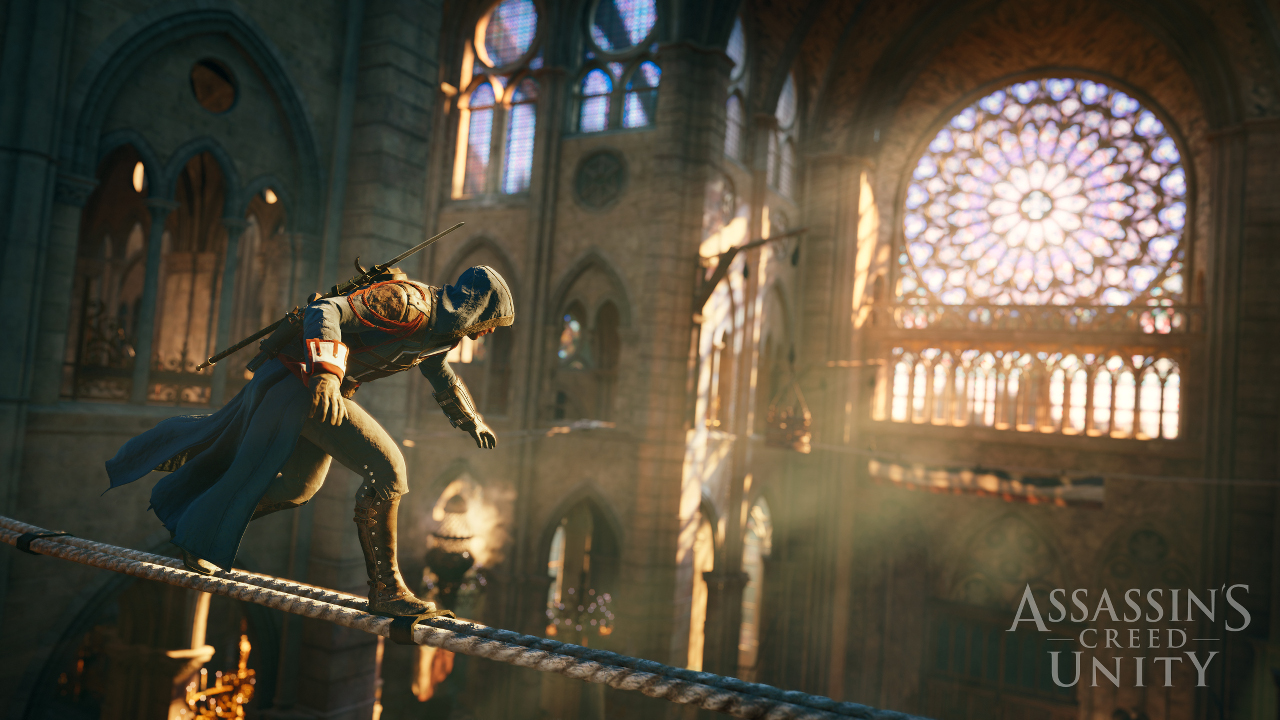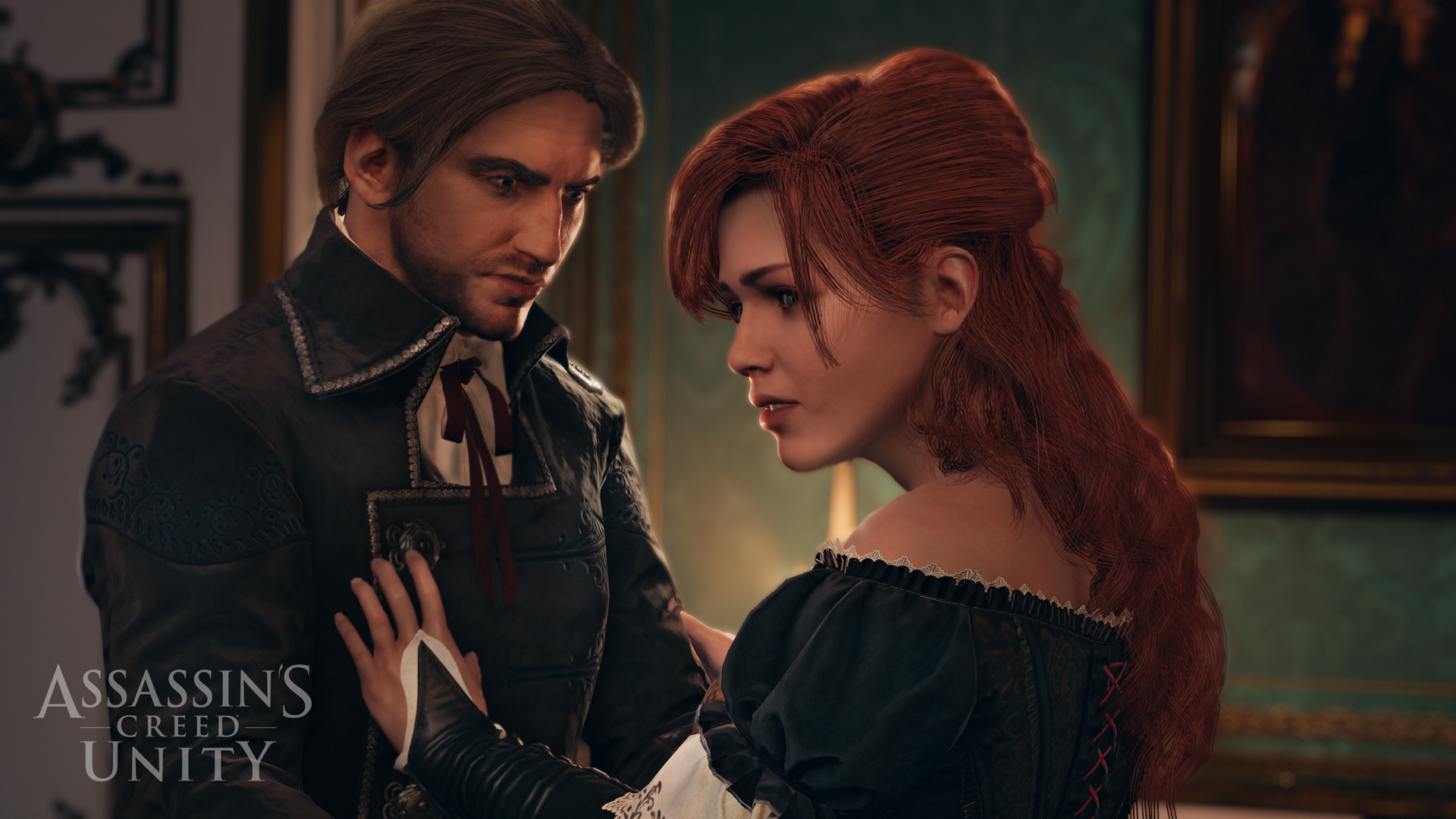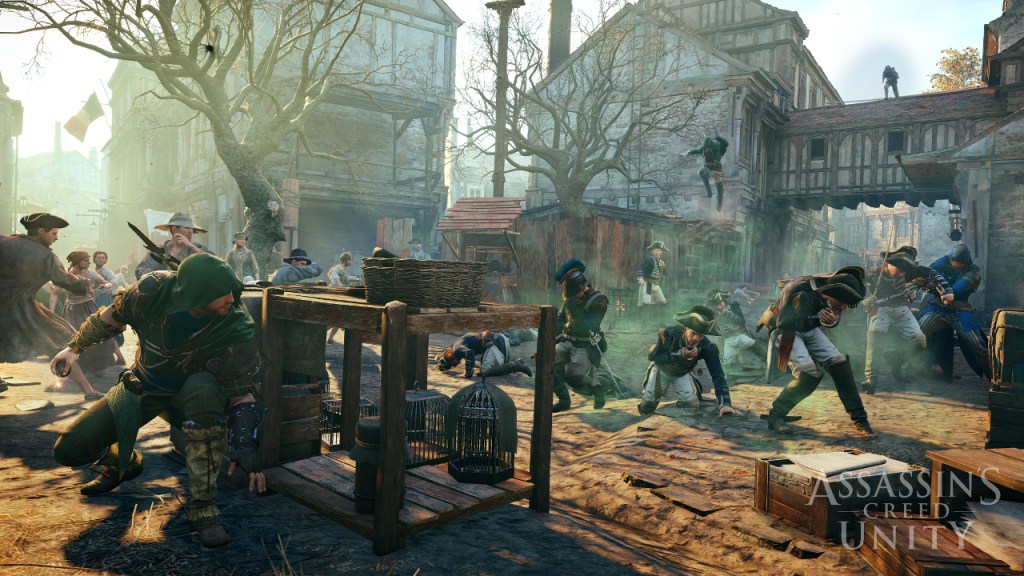History has easily proven itself the defining characteristic in one of my favorite open-world video game franchises, so I was excited to get a chance to speak with the mind responsible for every factoid I've ever gotten correct on a history exam during a preview event for Assassin's Creed Unity last week.
Don't forget to read our full hands-on preview of the game here and be sure to stick with GameRevolution for more Assassin's Creed coverage in the coming weeks. We also got hands-on with Assassin's Creed Rogue this week and we'll bring you new video and impressions of both titles before launch day, November 11th, 2014. Read on for our interview with AC Historian, Maxime Durand.
GameRevolution: The history aspect of Assassin’s Creed is my favorite part of the franchise. It’s odd though, because in school I hated the idea of studying history, I felt like it was really boring. I made this known in class and it wasn’t until Assassin’s Creed III that I felt like this is this really interactive way of understanding history that couldn’t be taught. What’s the challenge there?
Maxime Durand: Every game is a different challenge. It’s the same with the French Revolution. People have expectations over some time periods like the French and American revolutions which are very well known. Even pirates in Black Flag, I mean people have ideas…
GR: Like you can find records of slave trade…
MD: Yeah, and pirates well, usually they don’t keep great records so you have to understand the challenge in understanding criminology and then comparisons to motorcyclists in criminal gangs, but for a game like Assassin’s Creed Unity the challenge was more in making sure it was right, it was apolitical so not, we’re not taking sides in the way the French revolution is interpreted.
I mean, there are many aspects in the way we reproduce the city so for instance there’s the visual appeal, there’s this map we’re going to use and reuse, we make sure the old layouts are fine and then we make sure all the landmarks we have in the game and there’s a lot of them, there’s like 76 of them, from very high reproduction to lower fidelity reproduction and then we make sure we have landmarks everywhere that are relevant in history, they’re relevant with the gameplay that we have around them. They’re nice to see and play with in the game and then you have what’s on the street, what people do, how do you make the city alive? That’s one of the challenges and then on the other side there’s all this challenge in making sure we hit the right historical events and historical characters and in the French Revolution there are so many different characters and so many different events that it’s hard to choose from.
The American Revolution, people knew it just a little bit and more of the events this time around are well-known and we don’t want only to go with what people know and expect, we want to with more of that and making it very alive so you have fun discovering new stuff.
GR: Is that an iterative process or do you say this is where we want to go, this is the history we want to look at, and then the game is designed around that mission statement?
MD: It’s iterative. The more we go into the production process, the more we learn about the revolution and obviously from the start we tried to think about what are going to be the main events and characters and then even after that it can always change a lot. What you have in-hand with Assassin’s Creed Unity is very different from what we had a year ago. It’s always changing. The more we see like sometimes a character makes sense historically but then on the other side you have the technology to do a mission that can’t be in the game or the mission has changed and evolved and then we want to change the whole thing to make sure the technology and gameplay is relevant with the history. It’s not just a Hollywood set. It’s a vivid setting and everything has to have very strong links together.

GR: That was one thing that immediately attracted me to the series was that the first game was set in the middle ages which is completely foreign for video games…
MD: Especially, Jerusalem…
GR: And it’s so rich in history and tone and then each game has really changed how it presents itself so the Italian “trilogy” is very, very steeped in that culture and I want to ask if there is a framework or what system do you have in place to layer history into gameplay?
MD: First, we try to understand the time periods and we go with the really general stuff about every time period that’s different and we try to understand, for instance with Assassin's Creed III, we tried to understand what type of gameplay we could add and we went for naval mechanics and that isn’t really relevant for the French Revolution, but that’s the kind of decision where we look at what’s important in this time era, what’s important in these events, what’s the layout of the city and the more we go towards production the more we go into details. Sometimes there are things that we just couldn’t decide because either we don’t have enough information or we find out it’s not as relevant or we have to make a choice and go with something else.
Towards the beginning of the process, the scriptwriters, the core team will read a lot of books, watch a lot of movies and TV series, and the more we go into the details we’ll dig into archives to find very specific plans for the buildings or texture artists will ask for details of… for instance, an example in the city of Paris you have on the walls, maybe you saw them, there are grafittis and all of these are things we dug into history books for specialized art history where we could find records of real grafittis from that era. Sometimes we don’t have all the details and that’s history. Sometimes we only have parts of it and we’re discovering or trying to discover the past and make this city believable so when we don’t have all the information we go for an artistic view of history. Otherwise we try to bring as much real information into the game as we can.
All the crowd life is based on a document noting what people were doing in the street, what common people were doing in the streets of Paris. We used books that talked about corporations in the middle-class, upper-middle class, clock makers for instance. How do we bring that in the game? How does that effect the buildings? If you go in the first level of every building there’s a shop and the second level is a rich family and the more you go in heights in buildings in the city of Paris, the more you go into poor people the apartment is smaller. It’s the kind of history details that make a difference in the game.
GR: Is there historical accuracy in the interior designs like the taverns? I did one mission where I went into a monastery where monks were murdered. Is there a source for that kind of detail?
MD: Obviously, yes. Again every game is different in the way we manage history and the way we use history and we always try to make sure that it’s fun and realistic whilst having a good balance with history. We’re not trying to reach 100% accuracy and it would be impossible anyways.
GR: Does emotion sort of override history?
MD: The emotion is important. You watch a movie and it’s not just a setting, it’s the experience that you have and I think that’s what we have here and the volumetric clouds and fog and having the city covered in dust and it’s something you feel in every different district in the city and that’s what make it believable. Yeah, interiors, a lot of them are drawn from archives and some of the architecture that still exists today. That’s something with France and Paris and a lot of the details we have from today, a lot of people researched directly in Paris. With ACIII and Assassin's Creed IV Black Flag we had to dig a lot to get small details and information because it’s not studied as much or known as much.

GR: I was in a really small group of people who really liked Assassin’s Creed III. I gave it a 5/5. It’s the kind of game where I got it the weekend before release and I played straight through and the character of Connor, he really does cut through the revolutionary war in that dramatic fashion, but in Assassin’s Creed Unity there’s this focus on cooperative elements and side missions and distractions and a very lush open world, so even though every player is Arno even when they go online, is there still that motivation, that emphasis on his mission?
MD: I’m super happy you bring up this point because with Assassin’s Creed III, I worked on that for a long time and I was happy we were able to see all of those historical events and have the character in it, although sometimes it may have felt like a bit of a Forrest Gump effect. Every time he was there, this time around… we tried that but I think we learned that we prefer to have someone that’s a bit away in the background. The more you go into the cooperative missions and side content, the more you feel like you’re going towards history. You have less of the Templar and Assassin layer and more of just history. I think it enables us to have triple times the historical characters we used to have traditionally because for instance, you meet an executioner and you meet Schmidt, the inventor of the guillotine.
In the main path, you’re fighting you way through to save the world and to save your own soul and sometimes it feels difficult to take time to meet people and do side quests and I think that’s what we have right now. You can take that time and when you do side quests you’re experience something that’s really deep and then you can come back to the main mission afterwards if you want. It doesn’t break the feeling of history or the line of history. Obviously, we restrain players from meeting characters that they shouldn’t at that moment so for instance, you see one person in the main path and you might also see him in the side content but it’s all weaving together.











